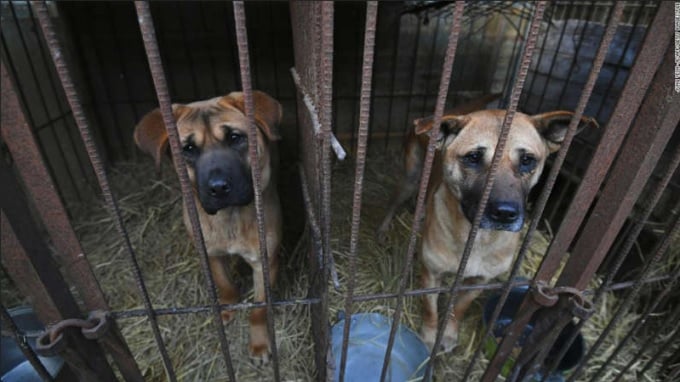The ancient Korean habit of eating dog meat has faced criticism from abroad, as well as growing opposition at home, especially from the younger generation.

Dogs at a rescue in Hongseong County, South Korea in February 2019. Photo: Getty
“It is time to end social conflicts and controversies surrounding dog meat consumption by enacting a special law to end it,” Yu Eui-dong, policy chief of the ruling People’s Power Party, said at a meeting with government officials.
The South Korean government and the ruling party will introduce a bill this year to implement the ban, Yu said, adding that with bipartisan support, the bill will soon be passed in the South Korean National Assembly .
Agriculture Minister Chung Hwang Keun said at the meeting that the South Korean government will quickly implement the ban and provide maximum support possible for those in the dog meat production industry to shut down their businesses.
First Lady Kim Keon Hee has been vocal in her criticism of dog meat consumption and, along with her husband, President Yoon Suk Yeol, has adopted stray dogs.
A previous bill to ban dog meat failed amid opposition from industry insiders and concerns about the livelihoods of farmers and restaurant owners. The new ban would include a three-year grace period and financial support for businesses that move out of the industry.
Eating dog meat is a long-standing custom on the Korean Peninsula and is seen as a way to beat the summer heat. But the practice is much less common than it once was, although it is still eaten by some older people and served in some restaurants.
Animal rights groups welcomed the prospect of a ban. “It is a dream come true for all of us who have campaigned so hard to end this cruelty,” Humane Society International said in a statement.
According to government figures, there are about 1,150 dog farms, 34 slaughterhouses, 219 distribution companies and about 1,600 restaurants serving dog meat in South Korea.
A Gallup Korea poll last year found that 64% opposed the consumption of dog meat. The survey found that only 8% of respondents had eaten dog meat in the past year, down from 27% in 2015.
Huy Hoang (according to Reuters, Yonhap)
Source


































































































Comment (0)